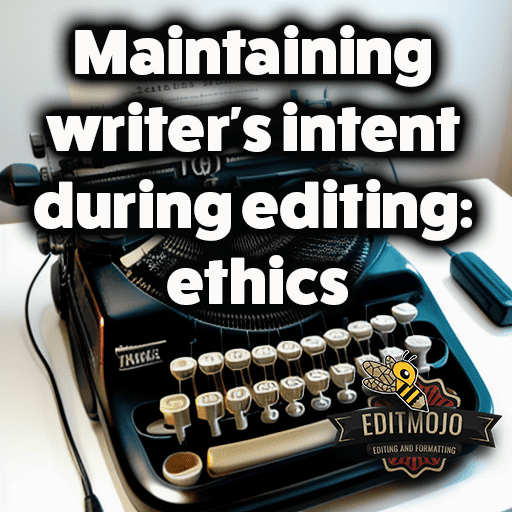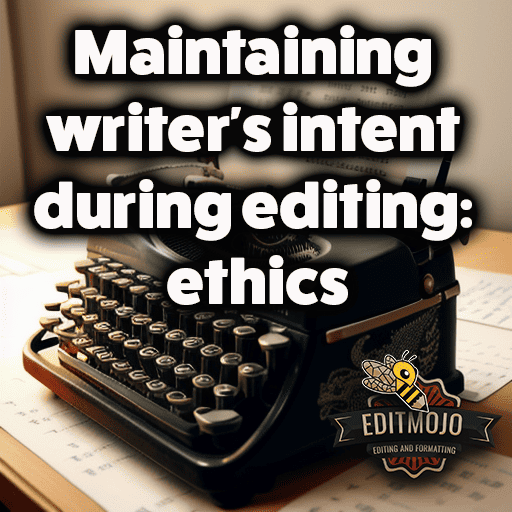Maintaining writer’s intent during editing: ethics
Maintaining writer’s intent during editing: ethics. In the world of writing and publishing, the role of an editor is crucial. They are the gatekeepers of quality, ensuring that the final product is polished, coherent, and engaging. However, one of the most challenging aspects of editing is maintaining the writer’s intent. This involves preserving the author’s voice, message, and style while making necessary revisions for clarity, grammar, and structure. Balancing these considerations with ethical guidelines forms the crux of an editor’s job. This article delves into the complexities of maintaining writer’s intent during editing and the ethical considerations involved.

Key Takeaways
| Section | Key Points |
|---|---|
| Understanding Writer’s Intent | Writer’s intent is the core message or purpose the author wants to convey. Understanding this is crucial for an editor to make appropriate revisions without altering the original meaning. |
| Ethical Considerations in Editing | Ethical editing involves respecting the writer’s intent, avoiding plagiarism, and maintaining transparency with all stakeholders. |
| The Business Aspect of Editing | Editors often have to balance ethical considerations with business needs, such as meeting deadlines and adhering to publication guidelines. |
| The Impact of Unethical Editing | Unethical editing can lead to misrepresentation of the author’s message, legal issues, and loss of credibility for both the author and the editor. |
| Guidelines for Ethical Editing | Best practices include clear communication with the author, understanding and respecting the writer’s intent, and adhering to a personal code of ethics. |
Top Five Questions and Answers
What is writer’s intent?
- Writer’s intent is the message or purpose the author wants to convey through their writing.
Why is maintaining writer’s intent important during editing?
- Maintaining writer’s intent is important to preserve the author’s voice and message. It ensures that the final product is a true reflection of the author’s original vision.
What are some ethical considerations in editing?
- Ethical considerations include respecting the writer’s intent, avoiding plagiarism, maintaining transparency with all stakeholders, and balancing editorial changes with the author’s original work.
What can be the impact of unethical editing?
- Unethical editing can lead to misrepresentation of the author’s message, legal issues, and loss of credibility for both the author and the editor.
What are some guidelines for ethical editing?
- Guidelines for ethical editing include clear communication with the author, understanding and respecting the writer’s intent, and adhering to a personal code of ethics.

Understanding Writer’s Intent
Writer’s intent is the heart and soul of any piece of writing. It is the author’s unique voice, the message they want to convey, and the impact they want to make on their readers. As an editor, understanding this intent is crucial. It requires empathy, active listening, and a deep understanding of the author’s perspective. Techniques to maintain writer’s intent during editing can range from having detailed discussions with the author to using tools that help preserve the author’s unique style.
Ethical Considerations in Editing
Editing is not just about correcting grammar and punctuation. It’s a delicate balancing act between making necessary changes and preserving the author’s original message. Ethical considerations come into play here. An ethical editor respects the writer’s intent, avoids introducing changes that alter the original meaning, and maintains transparency with the author about any significant changes. Case studies, such as the Gordon Lish’s work on Raymond Carver’s books, provide valuable insights into the ethical dilemmas editors often face.

The Business Aspect of Editing
In the professional world, editors often have to balance ethical considerations with business needs. Deadlines, publication guidelines, and market trends can sometimes pressure editors into making changes that may not fully align with the writer’s intent. However, a skilled editor knows how to mediate between these different stakeholders, ensuring a final product that is both market-ready and true to the author’s vision.
The Impact of Unethical Editing
Unethical editing practices can have far-reaching consequences. From misrepresenting the author’s message to potential legal issues, the stakes are high. It can also lead to a loss of credibility for both the author and the editor. Therefore, it’s essential to uphold ethical standards in editing.
Guidelines for Ethical Editing
Ethical editing is a skill that can be honed with practice and adherence to certain guidelines. Clear communication with the author is paramount. Understanding and respecting the writer’s intent, being transparent about significant changes, and developing a personal code of ethics are some of the best practices that can guide an editor in their journey.
Conclusion
Maintaining writer’s intent during editing is a challenging yet rewarding task. It requires a blend of empathy, skill, and ethical considerations. As we navigate the complex world of editing, let us remember that at the heart of every piece of writing is a writer with a message. Our job as editors is to help that message shine through, with integrity and respect.
